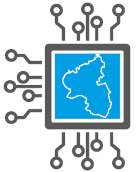Naturwissenschaftliche Informatik (M.Sc.) - Johannes Gutenberg University Mainz (JGU)
Provider
Quick Overview
-
The Degree Program contains References to AI Methods.
Type: Degree Program (University) Degree: Master (M.Sc.) Standard Period of Study: 4 Semester Credit Points: 120 ECTS Languages of Instruction: English, German Time Exposure: full time Study Type: Presence Study Start of Studies: Winter and Summer semester
Information about the Content
Computer science is a discipline dealing with the theory, techniques and applications of automated and machine storage systems and the processing and transfer of data and information, specifically with the aid of computers. Computer science has transformed our world and society over the past few years and decades as no other discipline has. Subsectors of computer science include practical and applied computer science, theoretical computer science and technical computer science. These sectors of Computer science are represented by the following six work groups at JGU:
Algorithmic Geometry and Computer Graphics:
Everyone can see the latest developments in computer graphics in the form of computer-animated films and computer games. The Algorithmic Geometry and Computer Graphics work group investigates the theoretical basis for efficient geometric algorithms and data structures and uses them in practical applications to create visualizations and to simulate movement processes. These applications are also relevant to computer-aided design, automated movement planning and packaging optimization.Efficient Computer and Memory Systems:
The research focus of this work group are memory systems and scalable computer systems. High performance computing (HPC) will progress into the realm of exascale computing over the next few years and create exciting challenges by so doing. HPC is in a time of transition from a purely computer-centric sector to an area where the management of data will play an ever greater role.Information Systems:
The primary subjects of this work group are data mining and machine learning. It develops methods to analyze large and complex quantities of data and adapts these methods for use in the life sciences and other areas (computational sustainability, energy, transport, social networks). The courses take the form of lectures, seminars and internships in the core areas of data mining and machine learning, but lectures are also offered on other aspects of applied computer science, such as database systems and software technology.Software Technology and Bioinformatics:
The research undertaken by this work group focuses on the development and application of bioinformatic methodologies and program packages, usually in close cooperation with academic and industrial partners. The potential applications for the developments include computer-supported diagnoses and prognoses as well as rational active ingredient design.Theoretical Computer Science:
The Theoretical Computer Science work group primarily investigates algorithm engineering in association with combinatorial optimization problems. Algorithm engineering involves the development and implementation of algorithms for solving problems in inter-disciplinary projects. The research projects require the theoretical development of algorithms as well as their practical implementation. The issues examined are primarily concerned with combinatorial optimization.Parallel and Distributed Architectures:
The focus of this work group is the design, implementation and evaluation of scalable tools for genome sequence analysis (bioinformatics) and computational science applications, whereby modern high performance computing technologies (HPC) are used e.g.: many-core architectures (e.g. CUDA-enabled CPUs), multicore architectures, heterogeneous clusters, FPGAs). The development of the methods and tools is usually undertaken in cooperation with interdisciplinary partners at Johannes Gutenberg University, including the Faculty of Biology, the University Medical Center and the Institute of Molecular Biology.
Additional Information:
Naturwissenschaftliche Informatik (M.Sc.) - Johannes Gutenberg University Mainz (JGU)
